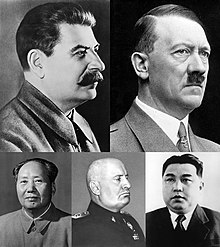Diktadore

Diktadorea erabateko boterea duen buruzagi politikoa da. Diktadura diktadore batek edo talde txiki batek gobernatutako estatua da.[1] Hitza Erromako Errepublikako magistratu baten titulu gisa sortu zen, Senatuak larrialdi garaian errepublika gobernatzeko izendatua (ikus diktadore erromatarra eta justitium).
"Tirano" terminoa bezala (jatorriz, antzinako grekozko titulu ez gutxiesgarria zena) eta maila apalagoan "autokrata" terminoa bezala, "diktadore" terminoa zapalkuntzan oinarritutako agintaritzari buruz hitz egiteko erabiltzen hasi zen. Erabilera modernoan, diktadore terminoa botere pertsonalaren kopuru izugarria duen edo gehiegikeriaz jokatzen duen lider bat deskribatzeko erabiltzen da. Diktadurek, sarritan, honako ezaugarri hauek izaten dituzte: hauteskundeak eta askatasun zibilak etetea; larrialdi-egoera aldarrikatzea; dekretuzko araua; aurkari politikoen errepresioa; legezko prozeduren erregimena ez betetzea, eta nortasuna gurtzea. Diktadurak, askotan, alderdi bakarreko edo alderdi nagusiko estatuak dira[2][3].
Diktadore gisa deskribatu izan dira boterera hainbat erregimenetan iristen diren buruzagi asko, hala nola batzar militarrak, alderdi bateko estatuak, estatu nagusiak eta gobernu pertsonal baten mendeko gobernu zibilak. Ezkerreko edo eskuineko diktadurak egon daitezke. Oro har, diktadore nor den erabakitzea zaila da, eta ikuspuntu politikoaren arabera aldatzen da.
Erreferentziak
[aldatu | aldatu iturburu kodea]- ↑ "Dictatorship" at Merriam Webster (2019)
- ↑ (Ingelesez) Papaioannou, Kostadis J.; Van Zanden, Jan Luiten. (2015-03). «The dictator effect: how long years in office affect economic development» Journal of Institutional Economics 11 (1): 111–139. doi:. ISSN 1744-1374. (Noiz kontsultatua: 2021-07-04).
- ↑ (Ingelesez) Olson, Mancur. (1993/09). «Dictatorship, Democracy, and Development» American Political Science Review 87 (3): 567–576. doi:. ISSN 1537-5943. (Noiz kontsultatua: 2021-07-04).
Kanpo estekak
[aldatu | aldatu iturburu kodea]Text is available under the CC BY-SA 4.0 license; additional terms may apply.
Images, videos and audio are available under their respective licenses.
